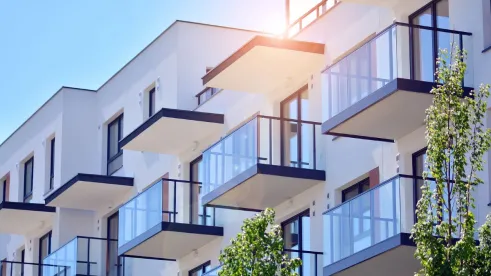In the City of Los Angeles, the “Homelessness and Housing Solutions Tax” (Measure ULA) commonly referred to as the “mansion tax,” went into effect on all qualifying real property transfers on April 1, 2023. Prior to Measure ULA, all real estate transfers in the City were subject to a City transfer tax of 0.45% and a County of Los Angeles transfer tax of 0.11%. Under Measure ULA, residential and commercial real property sales and transfers valued at or over $5 million, but less than $10 million, are subject to an additional tax of 4%. Sales and transfers valued at or over $10 million are subject to an additional tax of 5.5%. The Los Angeles Times noted that, based on the Multiple Listing Service, in March 2023 there were 126 homes and condominiums listed over $5 million in the City and in April, there were only two.[1] Understandably so, in anticipation of Measure ULA, owners and developers rushed to try to close escrow prior to the April 1st effective date.
Unlike the prior transfer tax, which excluded the value of any liens or encumbrances, Measure ULA is imposed on the gross value of the property, including the value of any liens or encumbrances remaining on the property at the time of transfer. As most commercial real estate comprises a combination of debt and equity, the additional transfer tax directly impacts possible development and investment opportunities. The measure does include exemptions from the special tax, including for certain nonprofits and affordable housing developments.[2]
Measure ULA established the House LA Fund to collect the special tax revenue, and allocate funds to the designated projects, and prevent homelessness.[3] Measure ULA was originally estimated to generate between $600 million and $1.1 billion annually to fund affordable housing projects, provide tenant aid, and support projects preventing homelessness.[4] Mayor Karen Bass’ $13.1 billion budget plan includes $1.3 billion to address homelessness. However, only $150 million in revenue is projected from Measure ULA, of which $62 million is proposed for property acquisition and rehab, $25 million for eviction defense, and $20 million for short-term emergency assistance for tenants.[5]
Measure ULA was a citizen initiative included on the 2022 Los Angeles County midterm elections that was approved by 57% of voters. A lawsuit was filed in December 2022 by two special interest groups, the Howard Jarvis Taxpayers Association and the Apartment Association of Greater Los Angeles, contending that the special tax is unconstitutional and prohibited by Proposition 13 of the California Constitution.[6] Shortly after, a second state lawsuit was brought by Newcastle Courtyards. A Los Angeles County judge recently determined that the two cases should be consolidated.[7]
The City’s financial advisors have warned that although the City may receive millions from this special tax, it may have to refund all of the funds if it ends up losing the now-consolidated lawsuit.[8] The Howard Jarvis Taxpayers Association has published on its website instructions on how to file for a refund if the lawsuit overturns the special tax.[9]
There is also a proposed state ballot initiative for the 2024 ballot known as the “Taxpayer Protection and Government Accountability Act,” which if passed, will repeal Measure ULA. This ballot initiative is supported by several organizations, including the California Business Roundtable, California NAIOP, and Howard Jarvis Taxpayers Association, and has collected approximately 392,000 signatures from within the County,[10] officially qualified by the California Secretary of State.[11] The proposed ballot initiative does not specifically reference Measure ULA, but it states that all new taxes passed by the California State Legislature would need to be approved by the voters and that any local special tax increases would have to be approved by the voters with a two-thirds vote. Any state and local taxes imposed between January 2022 and November 2024 that do not meet the ballot initiative’s requirements will be void. If passed, Measure ULA would be invalidated since it was only approved by 57% of voters and therefore would need to be reintroduced as a new ballot initiative and receive a two-thirds vote to be reimplemented.
FOOTNOTES
[1] Freeze in L.A. luxury market puts ‘mansion tax’ funds in limbo – Los Angeles Times (latimes.com)
[2] Exemptions, Sec. 21.9.14-21.9.16. LA_City_Affordable_Housing_Petition_H.pdf (unitedtohousela.com).
[4] “Proponents estimated that it could fund 26,000 units of new housing over the next decade and offer thousands of tenants assistance in paying their rent.” LA Times.
[5] LA Mayor’s Budget Includes $150M From Measure ULA (therealdeal.com)
[7] Judge Combines Two Measure ULA Legal Challenges (therealdeal.com)
[8] Money From LA’s Measure ULA Tax Mired in Legal Limbo (therealdeal.com) –
“City Administrative Officer Matt Szabo told mayor and City Council they need to decide if they’re willing to take the risk of spending the ULA money on key projects.”
[10] Kilroy Realty Backs Ballot Initiative to Repeal Measure ULA (therealdeal.com)



 />i
/>i
